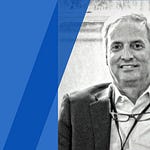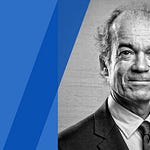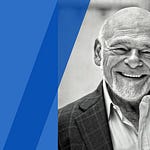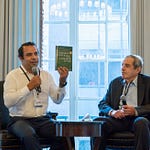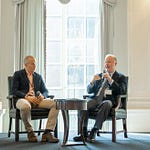In this conversation, Bill Coleman, Managing Director and Co-Chief Investment Officer of Live Oak Private Wealth, shares key insights into his long-term investing approach and philosophy. He emphasizes a deeply conservative strategy grounded in protecting the downside while letting the upside take care of itself. Bill’s guiding principle is to own equity in high-quality, durable businesses that generate strong cash flows. This focus on resilience and fundamentals underpins every decision he makes.
Bill also discusses the importance of patience and time arbitrage as a competitive edge. In a momentum-driven market increasingly dominated by passive index flows and mega-cap tech stocks, he is comfortable looking “out of sync” with the crowd. By avoiding the fear of missing out, he can wait through volatility and temporary setbacks for a company’s true value to be realized. He observes that structural changes, such as passive inflows causing extreme concentration in top names, have added to market swings. Against this backdrop, Bill’s willingness to be contrarian and stick to valuation discipline stands out.
Throughout the conversation, Coleman reflects on lessons learned from past mistakes. He notes instances where he lacked the imagination to foresee certain downsides in a once-thriving business. Such experiences reinforced the need for thorough, time-intensive research and creative scenario analysis. Bill’s humility in admitting missteps and his commitment to continuous learning demonstrate the value he places on adapting and improving his process.
The interview also delves into how Bill constructs and manages portfolios for clients. He describes conviction-based position sizing, i.e., larger allocations to his highest-conviction ideas, combined with very low turnover due to tax sensitivity. Bill explains that portfolio management must be flexible to accommodate client-specific realities, whether it’s integrating an inherited stock position or raising cash for a client’s sudden need. His approach balances maximizing returns with preserving capital and meeting individualized objectives.
Finally, Bill shares his perspective on leveraging modern tools like artificial intelligence in fundamental research. He has begun using AI-driven assistants to parse financial reports and earnings transcripts more efficiently. These technologies accelerate data analysis, but human judgment remains essential. Even as AI enhances the research process, Bill emphasizes that experience, intuition, and judgment are irreplaceable in making wise investment decisions.
The interview was conducted by Tyler Howell of MOI Global in July 2025.
Topics and themes:
Investment Philosophy – Downside Protection and Quality
Time Arbitrage and Patience in a Momentum-Driven Market
Passive Flows and Mega-Cap Concentration Reshaping Markets
Learning from Mistakes and the Value of Deep Research
Position Sizing, Tax Considerations, and Portfolio Flexibility
AI in Research and the Enduring Role of Human Judgment
Enjoy the conversation!
Transcript
The following text has been edited for grammar, readability, and flow.
Tyler Howell, MOI Global: It’s truly a great pleasure to be here with Bill Coleman, Managing Director of Live Oak Private Wealth here in Wilmington, North Carolina. Bill, you and I have been friends for a number of years, and you’ve been a great supporter of MOI Global. I always like to tell the story that one of my favorite MOI experiences was the dinner you so ably hosted at your residence for some of our members here in the area. Thank you for your support of MOI and for being here with me today.
Bill Coleman, Live Oak Private Wealth: You’re nice to say that, Tyler, and it’s great to have you here. I never dreamt in a million years what that original subscription to MOI Global would mean. I had no idea about the depth of investment talent, the ideas, the research, and the thoughtfulness behind it. I feel lucky to be involved. At times, when I participate in Best Ideas in January or the Wide Moat Summit, I think, Wow, there are some really smart people in this group. I feel fortunate to be part of it.
Tyler: I’d like to dive into your background, but before we do that, could you give us a layout of the firm—its structure, the connection with the bank—and then how you got started?
Bill: The firm will be seven years old next month. We opened the doors in the middle of a hurricane in September 2018. I was fortunate to partner with two other guys—one I had worked with at my predecessor firm, and another who came out of the private bank at Wells Fargo. We felt we had an opportunity to build a better-run, better-executed wealth management business than the typical firms like Merrill Lynch or UBS. We thought we could create a better mousetrap.
Today we manage around $1.3 to $1.4 billion. We’ve structured the team like an ensemble: dedicated CFP financial planners, a dedicated investment team with CFAs, experienced administrative professionals, an estate planning attorney, and a trust specialist. We all work together on behalf of our clients—almost like a general contractor coordinating with subcontractors.
The firm really came together from a hunting trip with the founder of Live Oak Bank. We shared a passion for bird hunting. On that trip, I mentioned the idea of a family office-type concept for the wealth created in founding Live Oak. One thing led to another, and before long, we were starting this business. Initially, it was going to be investment management only, but I argued for a more comprehensive wealth offering, and that’s what we built.
We launched in September 2018—in the middle of a hurricane, without power for seven straight days. Later, we had the chance to acquire Frank Jolly’s firm in Rocky Mount, North Carolina, which we integrated right in the middle of COVID. Those were challenging times, but today we have a team of 12 that works well together.
Tyler: Looking back at your decision to build a full-service wealth firm, how has that shaped your investment strategy?
Bill: It hasn’t changed my philosophy at all. I’m a deeply conservative investor, more focused on the downside than the upside—the upside takes care of itself. I believe equity ownership in great businesses with durable cash flows is the best place to put a dollar. Strategically, what has changed is the need for flexibility when managing comprehensive wealth. For example, if a client inherits shares of Duke Power they can’t sell for tax reasons, I have to incorporate that into the portfolio. Wealthy clients also have liquidity needs—you may need to raise half a million dollars quickly for a condo purchase. So I’ve had to be more flexible and accommodative, but philosophically nothing has changed.
Tyler: How does that translate into your process—idea generation and research?
Bill: I still look for the same kinds of businesses that have served me well over the years: necessary businesses with durability, ones that won’t be obsolete next week, businesses that don’t require heavy capital, and those with managements that allocate cash flow intelligently. I read company reports, filings, and voraciously consume the writings and letters of smart investors. I’m a shameless cloner. I wish I had more time for it, but I still try to spend 70–80% of my day on research.
Tyler: How do you approach position sizing?
Bill: We conviction-weight our positions. Berkshire Hathaway is our largest holding, partly because I bought it more than 20 years ago and never sold. Generally, we put the most capital behind our highest-conviction ideas. A small starter position for us is around 3%, while our largest holdings may be 9–10%. We keep turnover very low, as we’re extremely tax-sensitive. Ideally, we find compounding businesses and hold them for decades—companies like Berkshire, Visa, MasterCard, and HCA Healthcare, which have been in our portfolios for 15–20 years.
Tyler: Investors often talk about “edge.” How do you define yours?
Bill: If we have an edge, it’s practicing time arbitrage. We’re comfortable looking out of sync with the crowd. We don’t have FOMO. We’re willing to endure volatility if we believe the value is compelling and can wait for the turnaround. We also try to maintain a behavioral edge—recognizing how fear and greed drive markets and being willing to step in aggressively when others are panicking. During COVID, for instance, we put a lot of money to work when fear was rampant.
Tyler: You mentioned this is a particularly difficult period for investing. Why is that?
Bill: The structure of public markets has changed due to passive flows. With cap-weighted indexes like the S&P 500 and ETFs, massive money flows concentrate into the top 10 or 20 names. That creates distortions. We spend time educating clients about what it means when $1 million flows into the S&P—indiscriminate buying of Apple, Nvidia, and so forth. Paying 30–40 times earnings is a recipe for disappointment if growth slows even slightly. The actively managed pool of capital is smaller than it used to be. Volatility should be a friend of the intelligent investor, but it makes you double-check your theses more than ever.
Tyler: Do you feel pressure to play in the speculative sandbox?
Bill: Sometimes. I’m envious of results from businesses like Meta, which we don’t own. We thought it was too expensive, yet it grew into a great business. It’s difficult to capture the upside of bull markets if you don’t own mega-cap tech in size. But I want to compound wealth without taking undue risk with clients’ capital. Historically, we’ve done better in down markets by avoiding large drawdowns.
Tyler: Can you share an example of an investment—success or mistake?
Bill: One of our best long-term investments has been UnitedHealthcare, but it’s also become a mistake. Recently, changes in healthcare funding and underwriting pressures caught us off guard. I gave the business too much benefit of the doubt when it was trading at 20–25 times earnings. Utilization trends shifted, and the stock fell nearly 50% in seven months. It was a mispricing, and I didn’t fully imagine the downside risks.
Another example is Lululemon. It was a high flyer, but when execution slipped and growth slowed, the stock fell from the 350s into the 200s. Even then, it wasn’t a great investment. In hindsight, more imaginative scuttlebutt research might have identified the slowdown earlier.
On the flip side, companies like Google, Microsoft, Visa, MasterCard, HCA, and Berkshire have been multi-baggers for us over 15–20 years. They executed consistently, had strong management continuity, and did what they said they would. The lesson: buying right and sitting still often works best.
Tyler: Has AI entered your process?
Bill: Yes. I’ve used tools like Notebook LM and ChatGPT to analyze white papers, 10-Qs, and transcripts. Sometimes I prefer to listen to an AI-generated audio version instead of reading. We’ve compared different tools like Perplexity and ChatGPT by feeding in multiple earnings transcripts to identify common themes. AI saves time, but I believe human judgment remains essential, especially in recognizing fear-and-greed moments.
Tyler: How do you vet clients?
Bill: I’m not usually the first point of contact. But when I am, I ask whether their expectations are rational. If someone thinks markets deliver 11% annually in a straight line, they’re not a good fit. If they expect me to beat the S&P every year, not a good fit. I look for clients aligned with our conservative, comprehensive wealth approach.
Tyler: How do you compete with larger wealth management firms?
Bill: We do compete with them, especially in our region. The difference is that many of those firms use outside managers or ETFs, which allows them to scale more easily. We provide a more comprehensive service, so we can’t scale as broadly, but we believe it creates a deeper client experience.
Tyler: Looking five to ten years ahead, what’s your vision?
Bill: I expect Live Oak Private Wealth to be thriving. Personally, at 66, I’m still passionate about investing, though sometimes frustrated that results don’t always reflect my experience. I plan to stay active, but I’d also like more time for family, hunting, and fishing. I have two grandsons and a supportive wife I’d like to travel with. I’m not going anywhere soon, but I’m not getting younger either.
Tyler: Any final thoughts for the community?
Bill: I truly believe MOI Global is a remarkable community—sharing best practices, ideas, and mistakes. I’m a better investor because of it. I’d encourage others to take full advantage of it. If anyone wants to reach me, our firm is Live Oak Private Wealth, at liveoakprivatewealth.com, or you can find me on LinkedIn. I’d be happy to share ideas, mistakes, and learn from others.
Tyler: Bill, thank you for sharing your time with us.
As a Managing Director and Co-CIO at Live Oak Private Wealth, Bill Coleman co-chairs the Investment Committee and provides insight and direction to the asset management team. He is also involved in asset allocation, investment policy and portfolio management. Bill joined Live Oak Private Wealth with 32 years of experience in investment advising and brings focused expertise in asset management. He previously served as an executive and financial advisor for a large regional brokerage and investment banking firm. He is a graduate of Elon College. Bill enjoys spending time on the water with his wife and son and has a passion for offshore fishing and hunting.
Featured Events
Latticework 2025 (FULLY BOOKED), New York City (Oct. 7)
Ideaweek 2026, St. Moritz, Switzerland (Jan. 26-29, 2026)
Best Ideas Omaha 2026, Omaha, Nebraska (May 1, 2026)
The Zurich Project 2026, Zurich, Switzerland (Jun. 2-4, 2026)
Enjoying Latticework? Help us make it even more special.
Share Latticework (simply click the above button!)
Introduce us to a thoughtful speaker or podcast guest
Be considered for an interview or idea presentation
Volunteer to host a small group dinner in your city
Become a sponsor of Latticework / MOI Global
Volunteer by reaching out directly to John (john@moiglobal.com).




